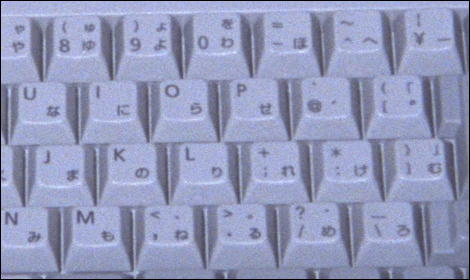They look the same:

Err, like this:

Lots of chording, I guess ;)
Posted on 12/31/2001 9:36:55 PM PST by Rowdee
REASONS WHY THE ENGLISH LANGUAGE IS HARD TO LEARN:
1) The bandage was wound around the wound.
2) The farm was used to produce produce.
3) The dump was so full that it had to refuse more refuse.
4) We must polish the Polish furniture.
5) He could lead if he would get the lead out.
6) The soldier decided to desert his dessert in the desert.
7) Since there is no time like the present, he thought it was time to present the present.
8) A bass was painted on the head of the bass drum.
9) When shot at, the dove dove into the bushes.
10) I did not object to the object.
12) There was a row among the oarsmen about how to row.
13) They were too close to the door to close it.
14) The buck does funny things when the does are present.
15) A seamstress and a sewer fell down into a sewer line.
16) To help with planting, the farmer taught his sow to sow.
17) The wind was too strong to wind the sail.
18) After a number of injections my jaw got number.
19) Upon seeing the tear in the painting I shed a tear.
20) I had to subject the subject to a series of tests.
21) How can I intimate this to my most intimate friend?
LET'S FACE IT--ENGLISH IS A CRAZY LANGUAGE!!!
1)There is no egg in eggplant nor ham in hamburger; neither apple nor pine in pineapple.
2) English muffins weren't invented in England or French fries in France.
3) Sweetmeats are candies while sweetbreads, which aren't sweet, are meat.
AND CONSIDER THIS......
We take English for granted. But if we explore its paradoxes, we find that quicksand can work slowly, boxing rings are square and a guinea pig is neither from Guinea nor is it a pig. And why is it that writers write but fingers don't fing, grocers don't groce and hammers don't ham?
If the plural of tooth is teeth, why isn't the plural of booth beeth? Or, one goose, 2 geese? So one moose, 2 meese? One index, 2 indices? Doesn't it seem crazy that you can make amends but not one amend.
If you have a bunch of odds and ends and get rid of all but one of them, what do you call it?
If teachers taught, why didn't preachers praught? If a vegetarian eats vegetables, what does a humanitarian eat?
English speakers should be committed to an asylum for the verbally insane. In what other language do people recite at a play and play at a recital?
Ship by truck and send cargo by ship? Have noses that run and feet that smell? How can a slim chance and a fat chance be the same, while a wise man and a wise guy are opposites?
Marvel at the unique lunacy of a language where your house can burn up as it burns down, in which you fill in a form by filling it out and in which an alarm goes off by going on.
English was invented by people, not computers, and it reflects the creativity of the human race (which, of course, isn't a race at all).
That is why, when the stars are out, they are visible, but when the lights are out, they are invisible.
Have a nice New Year...
Die Wiener Waschweiber wollen weisse waeshche waschenIsn't that what the witch doctor said?
They look the same:

Err, like this:

Lots of chording, I guess ;)
And, of course, it was done with a look at a little gayness to celebrate the New Year. :)
And a male seamstress is just sad. :)
Its not the words, its the spelling you have to worry about. :)
- Mark Twain, from "The Awful German Language"
One of my favorites ;)
Would a male seamstress be a "seamster"? Could a woman truck-driver be a "Teamstress"?
When's the last time you heard of anyone being gruntled, couth or combobulated?
There are a number of words like 'dust' 'moot' and 'with' that can mean exactly opposite things. (e.g., We fought with (alongside) the British in WWII; we fought with (against) the Germans in WWII.)
BTW, I agree with the earlier post thanking you for not posting this in "Breaking News" -- two clues: it's not news, and it's not breaking.
Disclaimer: Opinions posted on Free Republic are those of the individual posters and do not necessarily represent the opinion of Free Republic or its management. All materials posted herein are protected by copyright law and the exemption for fair use of copyrighted works.